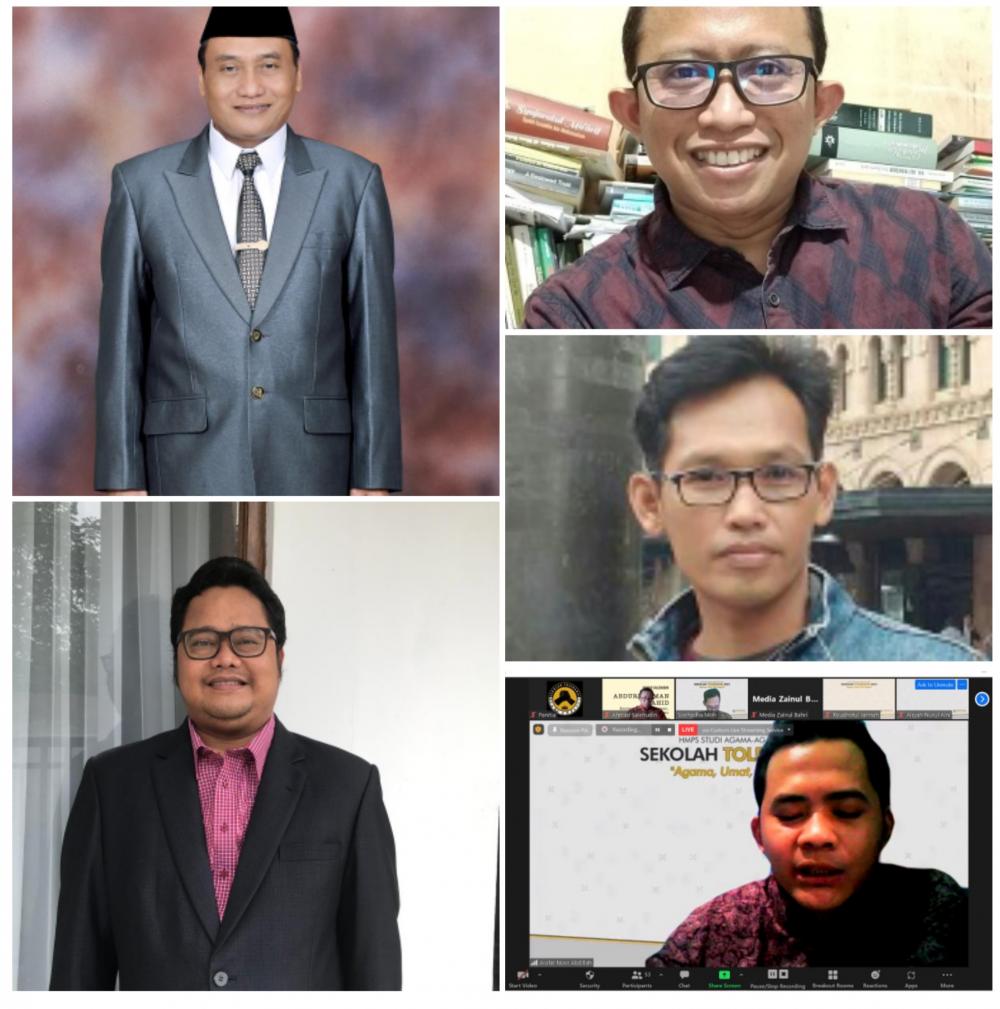Holding Tolerance Seminar, Religious Studies Sunan Kalijaga State Islamic University Students' Response to Frequent Religious Conflicts

The Student Association of the Study Program (HMPS) of Religious Studies at UIN Sunan Kalijaga, has completed holding the first series of "Tolerance School" performances on Saturday (30/10/2021).
The theme raised was "Conflict in Religious Communities: Is it Really Because of State Injustice?" by presenting a keynote speaker from the Head of the DIY Ministry of Religious Affairs, Dr. H. Masmin Afif, M.Ag., as well as three resource persons; Prof. Dr. Media Zainul Bahri, M.A. (professor of State Islamic University Jakarta), Dr. Ahmad Salehudin, S.Th.I., M.A. (lecturer in Religious Studies at State Islamic University Yogyakarta), and Dr. Moh. Soehada, S.Sos., M.Hum. (lecturer in Sociology of Religion at State Islamic University).
Taking into account the conditions that are still in the pandemic period, the event was held via Zoom Meeting webinar.
"This Tolerance School Week has indeed been carried out for a long time. However, for the past two years, due to the pandemic, it has been held online. Namely in the form of a webinar on the Zoom Meeting platform," said Fauzi, chairman of the event committee, on Friday (29/10/2021).
In his introduction to the discussion, the moderator of the event-Arafat Noor Abdillah, S.Ag., M.Ag.-said that from the past until now, religious conflicts in Indonesia have not ended. There are at least two kinds of conflicts. First, among religious communities. Second, between religious communities and the government. For the latter, it could be because there are parties who do not accept the basis of the state, because it is considered contrary to the religious understanding that is believed. Or it could also be from religious identity politics so that competition arises between religious communities in political contestation.
"Identity politics is dangerous. Even during the 2019 elections, in the Madura area there was a married couple who divorced just because of different political choices," said Salehudin when presenting his material.
In addition, according to Media Zainul Bahri, politics often divides religions. For example, in Islam, the emergence of many sects began with the war between Ali and Muawiyah. In other religions it is also not much different.
"In the Indonesian context, the state and religion are mutual, helping each other. The Ministry of Religious Affairs, which focuses on regulating the religious affairs of the community, has done its best in serving the affairs of each religion," said Masmin Afif in his presentation.
The same thing was also conveyed by Moh. Soehada, that from a sociological point of view, religious conflicts that often occur usually begin with differences in interpretation of religious texts. This then penetrates into a wider network until finally identity politics is formed between religions and sects.
Actually, the seminar above is part of a series of School of Tolerance events, which this year takes the grand theme "Religion, People and the State" and all are packaged in webinars. The event was divided into four sessions. Namely on Saturday, October 30, with two sub-themes, "Conflicts in Religious Communities: Is it Really Due to State Injustice?" and "Religion and Media: Segregation of Religious Communities in the Digital Age". Sunday, October 31, with one sub-theme, "The Influence of Religious Sects on the Integrity of Indonesia," and the last event to be held on Saturday, November 13, with the concept of a virtual tour road show event entitled, "A Closer Look at Religious Rites and Beliefs: Poncowinatan Temple Yogyakarta".
"I think, with the School of Tolerance event, students of Religious Studies of State Islamic University can add broader insights. In addition, events like this are also an effort to make Religious Studies play an active role in voicing tolerance and peace," said Dian Nur Anna, Head of Religious Studies , when giving a speech at the opening of the event.
Author; Slamet Makhsun (Secretary of HMPS Religious Studies)
